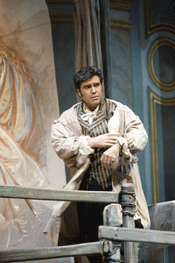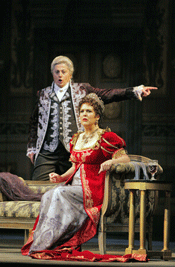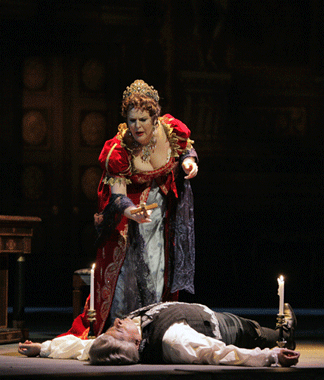12 Jun 2009
Tosca in San Francisco
Like Carmen, Tosca is a constant presence in our operatic lives, frequently revisited like it or not.

Like Carmen, Tosca is a constant presence in our operatic lives, frequently revisited like it or not.
Over the years some of the performances have even been memorable — fiery Carmens and intense Toscas, mesmerizing conducting, productions that have occasionally been gripping. And there have been those performances that are imminently forgettable.
We may all have had our favorite performance, the one to which we compare all others. Or perhaps none of the productions we have seen have come near our idea of what the perfect Carmen or the perfect Tosca should be. This latest San Francisco Opera rendition of Tosca will be many things to many people, though it is unlikely to be anyone’s favorite, more likely for most of us it is one to be forgotten. The sooner the better.
 Carlo Ventre (Cavaradossi) [Photo by Terrence McCarthy courtesy of San Francisco Opera]
Carlo Ventre (Cavaradossi) [Photo by Terrence McCarthy courtesy of San Francisco Opera]
Back in 1997 SFO general director Lotfi Mansouri had the kitsch
idea of reviving the 1923 San Francisco Opera production (the first SFO season)
to reopen the repaired War Memorial Opera House. Kurt Herbert Adler had also
once dragged it out for some occasion, maybe it was to commemorate the
company’s fiftieth anniversary. Just now David Gockley must have
calculated the savings to be had by hanging these old canvases instead of
paying for a modern production. And perhaps he believes that these old rags are
like an old sweatshirt, just too comfortable and lovable to throw out.
Here in San Francisco we were once promised the Tosca of Maria Callas, but instead we had the brilliant Marie Collier. We had the Tosca of Magda Olivero at age 71 (she is now 99), a holdover from the golden age of verismo to show us how it was supposed to have been done. And we have had a host of lesser and greater Toscas over the years. The latest one is Canadian soprano Adrienne Pieczonka, whose full, rich and even voice makes a plush, comfortable Tosca quite at odds with the quixotic temperament of the high strung murderess who crosses herself and then hurls herself into the void. Need one be reminded that Puccini’s Tosca is a character defined role.
 Lado Ataneli (Scarpia) and Adrianne Pieczonka (Tosca)
Lado Ataneli (Scarpia) and Adrianne Pieczonka (Tosca)
Cavaradossi was Italian tenor Carlo Ventre who brought bona fide Italianate
vocalism, and bona fide stock Italianate acting gestures. Mr. Ventre comes from
the Carreras mold, heaving his voice from his throat and chest, igniting an
exciting squillo when needed. Preoccupied with tenorial sound he found
none of the sweetness Puccini imbued into the arias of his sentimental painter,
leaving this tenor under appreciated by a crowd ready to cheer. He was however
a strength of the production.
Georgian baritone Lado Ataneli seemed a more versatile artist than his colleagues as he was able to combine singing with character. The sheer power of Puccini’s Scarpia though must tower over the artistic personalities of his victims. He must embody both spiritual and temporal power, and the brute force of pure libido. Mr. Atanel’s more sophisticated approach to his role was instead overwhelmed by the more operatic, less dimensional performances of his colleagues.
 Adrianne Pieczonka (Tosca) and Lado Ataneli (Scarpia)
Adrianne Pieczonka (Tosca) and Lado Ataneli (Scarpia)
Both conductor Marco Armilliato and stage director Jose Maria Condemi
confused verismo with realism, meticulously illustrating every twist
and turn of the text. Verismo is direct, immediate emotion, not
elaboration of detail. It is thus that verismo lends itself to melodrama
— a sudden shocking action that unleashes a huge emotion. Rather than
build to the melodramatic moments that cap each of Puccini’s three acts,
this production lost itself in tedious detail, exacerbated by a Tosca and
Cavaradossi physically incapable of inhabiting their characters. Mo. Armilliato
sometimes took his musical illustration to extremes, forcing his singers to
establish and hold the beat of the text while he dragged it emotively. It was
here that tedium became torture.
Of the smaller roles, the Spoletta of Joel Sorensen was effective, the scenes involving Scarpia’s henchmen were in fact skillfully drawn by stage director Condemi. The Sacristan of Dale Travis and his scenes were terminally cute, the San Francisco Boys Chorus proving itself once again one of our city’s great treasures.
It is time for a new Tosca in San Francisco, a theatrical one.
Michael Milenski